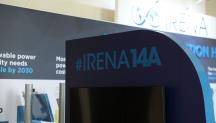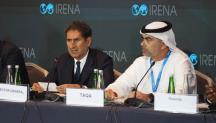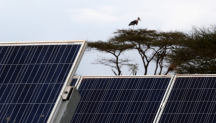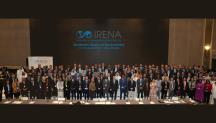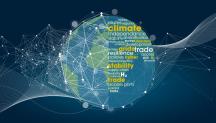

Renewables at the Heart of G20 Hamburg Energy Action Plan
Newsletter
Leaders of the world’s biggest economies envision renewables' key role in economic growth
The world’s commitment to a renewable energy powered future strengthened this month as leaders of the G20 — a bloc of the 20 world’s most powerful economies — revealed a Climate and Energy Action Plan for Growth, placing sustainable renewables at the centre of efforts to rejuvenate the global economy and address climate change.
Guided by the UN’s Sustainable Development Goals and the Paris Agreement, the shares the understanding that the energy system is the backbone of economies and that diverse energy systems rely on affordable, secure and sustainable energy sources and clean technologies like renewables.
Stating that renewables play a significant role in the transition to sustainable and low greenhouse gas emission energy systems in their economies, the G20 countries' plan describes the numerous co-benefits sustainable energy technologies provide, such as job creation, reduced air pollution and enhanced energy security.
Speaking at the “G20 Africa Partnership – investing in a common future” conference on 12 June, Germany’s Federal Chancellor Angela Merkel highlighted how renewables are already making an impact in Africa and will continue to do so, “The economies of some African countries are remarkably dynamic. Some are even growing faster than the industrialised and newly industrialised economies of the G20. Success stories like those should inspire others. They reveal the potential that lies in African countries – for example in the field of renewable energy and digital development. There are many good examples of decentralised energy supply and much more besides.”
Investing in a sustainable future
Germany, holding the G20 Presidency and hosting this year’s G20 Leader summit in Hamburg, held on 7 and 8 July, commissioned IRENA and the International Energy Agency, to produce Perspectives for the energy transition: Investment needs for a low-carbon energy system, a report that shows how additional investments in renewables to the tune of USD 29 trillion dollars over the next 33 years could decarbonise the energy sector and meet the goals of the Paris Agreement.
“If we delay action, the cost will however be much higher. It is therefore imperative that we intensify our efforts to spur innovation, not only in technology but also in policy, business models and market design,” says IRENA Director-General Adnan Z. Amin.
The report’s macroeconomic analysis suggests that such investment would create a stimulus that, together with other pro-growth policies, will boost global GDP by 0.8% in 2050; generate new jobs in the renewable energy sector that would more than offset job losses in the fossil fuel industry; and improve human welfare through important additional environmental and health benefits thanks to reduced air pollution.
Innovating for new energy
Innovation in sustainable and clean energy technologies is a top priority for G20 members, and the Climate and Energy Action Plan for Growth seeks to strengthen G20 collaboration in research, development and demonstration for technological innovation, to accelerate development and deployment of sustainable and clean energy technologies.
“Innovative solutions can help integrate higher shares of variable renewable energy in power systems. Innovative policy frameworks can attract investments, drive cost reductions, and help accelerate deployment of renewables in end-use sectors such as transport, industry and building where it is lagging,” says IRENA’s Director-General.
A recently released IRENA working paper identifies priorities for innovation that will enable the decarbonisation of the energy sector, highlighting that renewable generation technologies are already economically viable, and innovation, together with economies of scale, will continue to reduce their costs and attract investment. The next step for the power sector is to focus innovation efforts on integrating high shares of variable renewable energy in power systems, and that policy frameworks to stimulate innovation can ensure a balance of new technologies and in other areas.
This year's developments in Hamburg build on a growing relationship of cooperation between IRENA and the G20. In 2015, the G20 countries affirmed their commitment to renewable energy through the adoption of an IRENA-led renewable energy toolkit, which provides options for G20 countries to take a long-term, integrated and sustainable approach towards enhanced deployment of renewable energy. In June 2016, progress on work completed under the toolkit was reviewed with the aim to mobilise more finance, reduce costs and chart renewable potential. In this body's latest action plan, the G20 calls on IRENA to support their efforts in providing a regular update report with relation to the global transformation of the energy sector and further investment needs.
The G20 says it intends to collaborate closely on climate and energy issues to address the challenges of energy security and productivity, environmental protection, and to fully harvest the opportunities for innovation and economic growth — recognising that advancing renewable energy deployment contributes substantially to global greenhouse gas emission reductions, global energy developments and global prosperity.
